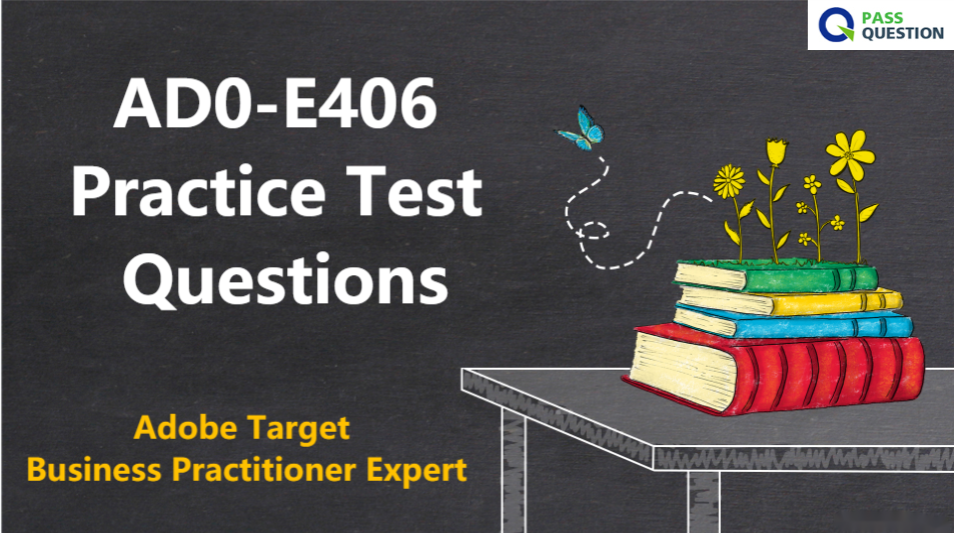AD0-E406 Practice Test Questions - Adobe Target Business Practitioner Expert
If you are intended to pass AD0-E406 Adobe Target Business Practitioner Expert exam,PassQuestion offers the latest AD0-E406 Practice Test Questions that will help you pass your Adobe AD0-E406 exam in the first attempt with desired results.Our AD0-E406 Practice Test Questions focus on each topic of the exams and these will help you in the best way to clear all of your doubts about your AD0-E406 exam.You will be able to take the Adobe AD0-E406 exam more confidently and this will help you in paving the path to the success in the exam.

Adobe Target Business Practitioner Expert Certification
The Adobe Certified Expert - Target Business Practitioner certification is the industry-recognized validation of one's proficiency in utilizing Adobe Target, using experiences, targeting and goals and settings for optimization.This Certification is for individuals who can create and manage the activities delivered with the Target tool and recommend the best ways to use the tool to solve a given problem or problems.
Exam Details
Exam number: AD0-E406
Exam name: Adobe Target Business Practitioner
Certificate level: Certified Expert
Status: Active
Available languages: English
Number of questions: 68
Formats: Multiple choice and multiple select
Duration: 136 minutes
Delivery: Online proctored (requires camera access) or test center proctored
Passing mark: 46/68
Price: $225 USD / $150 USD (India only)
Exam Sections
Section 1: Planning and strategy (31%)
- Identify business KPIs and successfully translate these into optimization goals given key business requirements
- Identify opportunities for optimization based on business KPIs and data analysis
- Prioritize test ideas based on business needs, level of effort, and potential for lift
- Based on the Adobe Sample Size Calculator, determine how variables impact the activity
- Construct test hypotheses based on a given scenario and identify hypotheses elements
- Analyze a test hypothesis based on a given scenario and identify aspects of a valid hypothesis
- Determine KPI-based primary and secondary success metrics
- Assess audience requirements
- Determine the appropriate analytics reporting sources (i.e., Target or Adobe Analytics)
Section 2: Configuring, Executing and Managing (42%)
- Explain the use of Form-Based Experience Composer vs. the Visual Experience Composer
- Apply procedures to create an experience using VEC
- Apply procedures to create an experience using Form-Based Composer
- Apply procedures to manage experiences within an experience composer
- Describe the workflow that applies to creating Target Activities
- Apply procedures to create an A/B test activity
- Apply procedures to create an XT activity
- Apply procedures to create an MVT activity
- Understand how AP is used for solutions
- Apply procedures to create a Recommendation activity
- Apply procedures to create an Audience in Target
- Apply procedures to set Goals and Settings
- Apply procedures to conduct Activity QA
- Apply procedures to manage Activities and Audiences within Target
Section 3: Analyzing and Reporting (17%)
- Define and evaluate report settings to help set the elements that appear in a report
- Evaluate and compare Adobe Target Sample Size Calculator settings when both planning Target activities and validating Target activities reports
- Evaluate and identify common problems associated with A/B testing and how to avoid them
- Understand how Automated Personalization Summary reports differ from other reports
- Evaluate Experience Performance reports (MVT)
- Determine the winning variation based on the observed lift, confidence levels and business objectives
Section 4: Troubleshooting (10%)
- Diagnose activity qualification issues
- Use browser debugging tools (including Experience Cloud Debugger) to verify implementation
- Verify metrics and reporting
View Online Adobe Target Business Practitioner Expert AD0-E406 Free Questions
A restaurant chain that Has been running a Recommendation activity to promote sides and add-ons decides to run the same activity on its native mobile app only.
Which experience composer should an Adobe Target Business Practitioner use to accomplish the task?
A.The visual Experience Composer
B.The Form-based Experience Composer
C.The SPA Visual Experience Composer
Answer:B
Which two options describe the purpose of any secondary success metric? (Choose two.)
A.Give additional understanding to interpret gains/losses of primary success metric.
B.These metrics are only used to measure time on site and primary metrics.
C.These metrics are only used to evaluate which audiences best respond to experiences.
D.Ensure that primary success metric gain is not at the cost of secondary metrics.
Answer:AC
When using the traffic estimator in an Multivariate test, which two things can be done if there is not sufficient traffic for the activity? (Choose two.)
A.Increase the number of combinations of offers and the number of locations.
B.Increase the duration of the test.
C.Reduce the number of combinations of offers and the number of locations.
D.Reduce the duration of the test.
Answer:B, C
The optimization team decided to test headline variations on a page. The Adobe Target Business Practitioner received snippets the styling properties.
How should this task be done in the Visual Experience Composer
A.Copy the values from the code snippets and paste them into the layout panel.
B.Copy and paste the code snippets into the CSS Editor.
C.Ask the development team to add the code to the CSS of the site.
Answer:A
The product team wants to determine whether a ‘viewed also viewed’’ or bought also bought’’ Recommendations logic would drive product views.
What is the correct way to test both Recommendations Criteria?
A.Create a new Recommendations activity, and in the Targeting page change the Control traffic allocation to 50%.
B.Create a new A/B test activity, and in the Targeting page select the two Criteria.
C.Create a new Recommendations activity, and in the Experiences page pop-up select the two Criteria.
Answer:A
Comments
Post a Comment